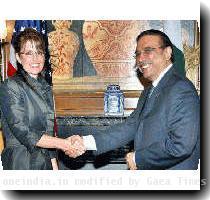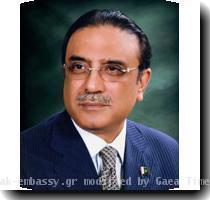News reports say at least 15 injured in an explosion outside Pakistani city of Lahore
By APMonday, November 2, 2009
Reports: At least 15 hurt in Pakistan explosion
LAHORE, Pakistan — News reports say at least 15 people were injured when a bomb went off near a police checkpoint on the outskirts of Lahore.
City police chief Pervaiz Rathor confirmed that a bomb exploded Monday but had no information on casualties. TV news channels are reporting at least 15 people were hurt.
Mohammad Saeed, a police constable, told Geo TV he saw a car approach the checkpoint and then explode. He added: “It was horrible.”
The Lahore blast came hours after a suicide bomber killed 35 people outside a bank in the city of Rawalpindi.
Suspected militants have struck repeatedly in the past month, killing more than 300 people in apparent retaliation for an army offensive in a Taliban stronghold. THIS IS A BREAKING NEWS UPDATE. Check back soon for further information. AP’s earlier story is below.
RAWALPINDI, Pakistan (AP) — A suicide bomber killed 35 people outside a bank near Pakistan’s capital Monday, as the U.N. said spreading violence has forced it to start pulling out some expatriate staff and suspend long-term development work in areas along the Afghan border.
Islamist insurgents have carried out numerous attacks in Pakistan in recent weeks, killing more than 300 people in retaliation for an army offensive in the Pakistani Taliban’s northwest stronghold of South Waziristan. Several U.N. personnel have been among those killed, and the group’s decision to suspend development work could imperil Western goals of reducing extremism by improving Pakistan’s economy.
Monday’s attack in Rawalpindi, a garrison city just a few miles (kilometers) from Islamabad, occurred as many people waited outside the National Bank on a pay day to collect salaries.
The bank is close to the army’s headquarters, and a majority of the people waiting in line were from the military, said Mohammad Mushtaq, a soldier wounded in the attack. Militants raided the headquarters last month, a 22-hour standoff that left 23 people dead.
“I was sitting on the pavement outside to wait for my turn,” said Mushtaq, who suffered a head injury. “The bomb went off with a big bang. We all ran. I saw blood and body parts everywhere.”
Four soldiers were killed in the attack and nine were wounded, said the army’s chief spokesman, Maj. Gen. Athar Abbas. In total, 35 people were killed, said Information Minister Qamar Zaman Kaira. Several dozen were wounded.
One panicked father near the bank when the explosion occurred said he was unable to find his son in the aftermath.
“I parked my car in the bank car park, and my child was sitting inside,” Mohammad Saleem told AP Television News. “Now they’re not giving me permission to go and look, and I don’t know where my child is.”
No group claimed responsibility for the bombing, but that is not unusual in attacks that kill many civilians.
Pakistan’s president, prime minister and other top officials condemned the blast but vowed to continue the offensive in South Waziristan, an impoverished and underdeveloped tribal region next to Afghanistan where al-Qaida is believed to have hide-outs.
The U.S. supports the operation because it believes South Waziristan is a safe haven for Islamist extremists involved in attacks on Western troops in Afghanistan.
The top U.S. and NATO commander in Afghanistan, Army Gen. Stanley McChrystal, met with Pakistani army chief Gen. Ashfaq Parvez Kayani on Monday at the army headquarters in Rawalpindi. The U.S. Embassy declined to say if he was there at the time of the attack.
Washington has also stepped up its efforts to use development aid in a broader battle against spreading militancy. The U.S. government recently approved $7.5 billion in aid over five years to improve Pakistan’s economy, education and other nonmilitary sectors.
But the U.N. decision to suspend long-term development work in Pakistan’s tribal areas and its North West Frontier Province could frustrate Washington’s goals.
The U.N. made its decision after losing 11 of its personnel in attacks in Pakistan this year, including last month’s bombing of the World Food Program’s office in Islamabad that killed five people.
U.N. workers were also among the 11 killed in a June suicide bombing of the Pearl Continental Hotel in the main northwest city of Peshawar, and a veteran U.N. official was shot dead while resisting kidnappers at a northwest Pakistan refugee camp in July.
The world body will reduce the level of international staff in the country and confine its work to emergency, humanitarian relief, and security operations, and also “any other essential operations as advised by the secretary-general,” the organization said in a statement.
The U.N. has been deeply involved in helping Pakistan deal with refugee crises resulting from army offensives against militants in the northwest.
U.N. spokeswoman Amena Kamaal told The Associated Press that the organization is still determining which programs will be suspended and how many staffers will be withdrawn from the country. She said “long-term development” applied to programs with a five-year or longer timeframe. The staff that remains in the country will be assigned additional security, she said.
“We have had 11 of our colleagues killed because of the security situation,” Kamaal said. “All of the decisions are being made in light of that.”
The U.N. has deemed 12 other countries or parts of countries so dangerous that it has suspended long-term development work, but that does not include Afghanistan, said Ian Miller, a U.N. official in Islamabad.
He said the decision was driven by the “less and less discriminative nature of Taliban targeting” in Pakistan.
Foreign Ministry spokesman Abdul Basit said Pakistan understood the U.N.’s reasoning, but that he hoped the organization would resume its development work after the military completed its operation in South Waziristan.
Pakistan’s shaky, U.S.-allied government also came under pressure Monday when a faction of the ruling coalition suggested President Asif Ali Zardari step down and face corruption charges.
The parliament is currently debating a measure that grants the president and others amnesty from corruption charges, and a rift within the ruling coalition could lead to distractions just as the U.S. wants Pakistan to focus on fighting militants.
The measure initially came into force under the military government of Pervez Musharraf, but legal challenges to it have led the young civilian government to place it in front of parliament.
Altaf Hussain, leader of the Muttahida Qaumi Movement party, told Geo television that “the president and his aides have to sacrifice to save the country, system and democracy” and said his party would oppose the measure.
The MQM’s motivations for confronting Zardari were unclear, mystifying some political analysts who noted Monday that the party is believed to benefit from the amnesty measure.
Zardari denies the corruption allegations, and has already spent years in prison fighting them. Fauzia Wahab, a spokeswoman for Zardari’s party, said the MQM has the right to express its opinion.
Associated Press writers Zarar Khan and Nahal Toosi in Islamabad contributed to this report.
Tags: Afghanistan, As-pakistan, Asia, Asif Ali Zardari, Bombings, Central Asia, Islamabad, Lahore, North America, Pakistan, Sarah palin, South Asia, Terrorism, United States

